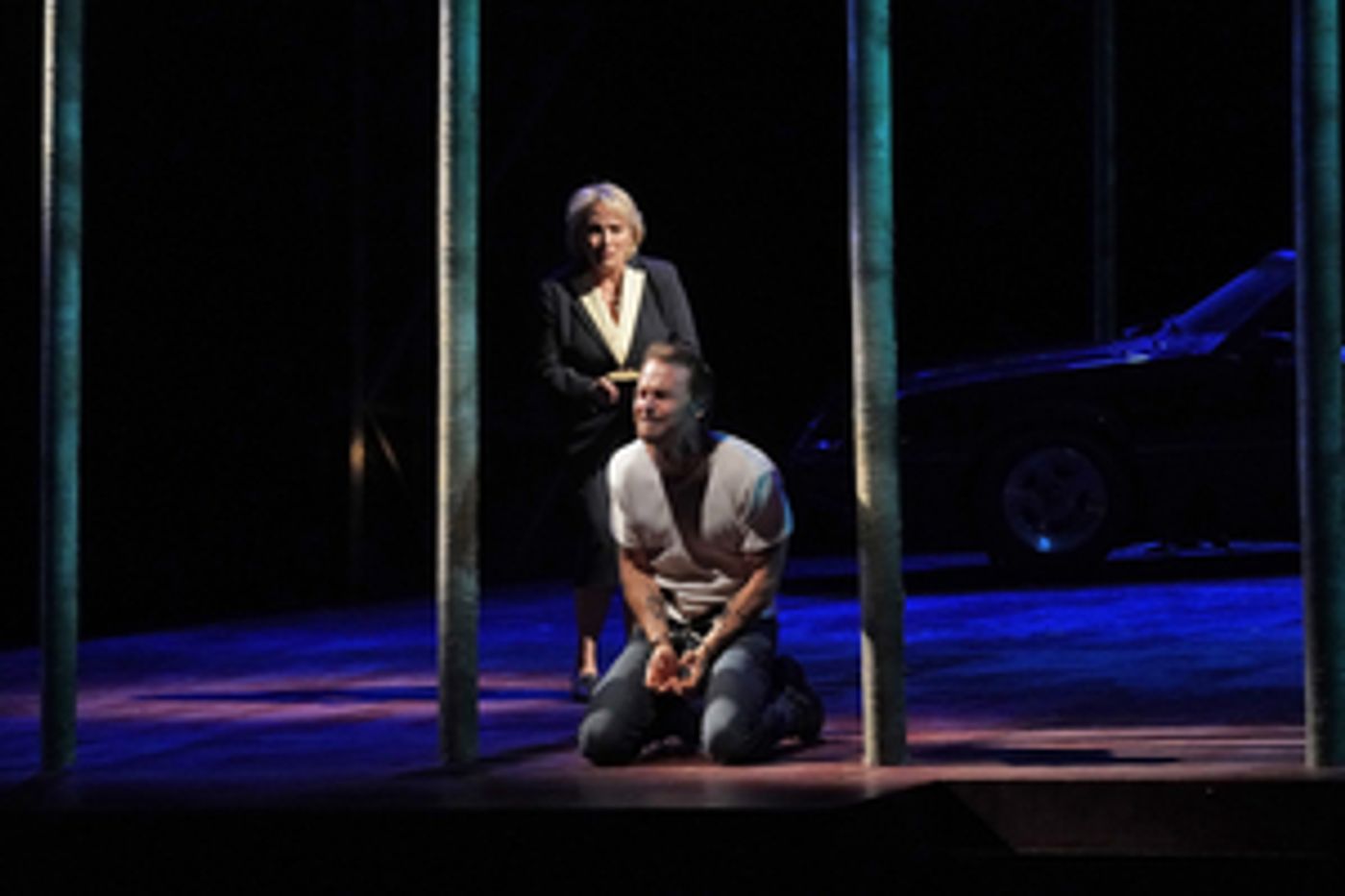Review: DEAD MAN WALKING at Lyric Opera Of Chicago
 There's nothing subtle about Lyric Opera's staging of Jake Heggie and Terrence McNally's contemporary opera DEAD MAN WALKING. Based upon the novel of the same name by Sister Helen Prejean, DEAD MAN WALKING focuses on Sister Helen's relationship with 29-year-old Joseph De Rocher, a prisoner on death row in Angola, Louisiana convicted of the murder of a young couple (and the sexual assault of a young woman). While DEAD MAN WALKING clearly aims to be morally complex in its exploration of capital punishment and the notion of whether or not we should also treat criminals as human beings, the piece feels overwrought. The debate at the opera's center is painted with broad strokes; at one point, we literally see protestors outside the prison holding picket signs depicting both sides of the argument.
There's nothing subtle about Lyric Opera's staging of Jake Heggie and Terrence McNally's contemporary opera DEAD MAN WALKING. Based upon the novel of the same name by Sister Helen Prejean, DEAD MAN WALKING focuses on Sister Helen's relationship with 29-year-old Joseph De Rocher, a prisoner on death row in Angola, Louisiana convicted of the murder of a young couple (and the sexual assault of a young woman). While DEAD MAN WALKING clearly aims to be morally complex in its exploration of capital punishment and the notion of whether or not we should also treat criminals as human beings, the piece feels overwrought. The debate at the opera's center is painted with broad strokes; at one point, we literally see protestors outside the prison holding picket signs depicting both sides of the argument.
I am compelled to mention that DEAD MAN WALKING opens with a graphic depiction of sexual violence as we watch De Rocher commit his crime. Director Leonard Foglia's staging of this moment is extremely disturbing. And while I'm not one to usually give trigger warnings in my reviews, I find it important to emphasize just how graphic the scene is and that it might rightfully dissuade some audiences from seeing the opera for this reason alone. That initial scene also feels even more uncomfortable because the rest of the opera focuses squarely on De Rocher, the perpetrator. Although the opera's point is to contemplate what kind of punishment De Rocher should rightfully receive so that he can learn from this horrific act, seeing that moment staged made it extremely difficult for me to see any humanity in his character.
It is worth noting that Heggie's score is stunning and beautifully underscores all of the emotional moments in the piece. Heggie's overture sets the tone for this deeply serious opera, and his compositions provides a brilliant contrast with the directness of McNally's language. The libretto itself uses plain English, fitting for the characters. This strikes the right tone and suits the main players of the opera.
As to be expected from any Lyric production, DEAD MAN WALKING is beautifully sung. Though I was deeply troubled by his character as written in the text, Ryan McKinny is remarkable as Joseph De Rocher. He has a compelling and full bass-baritone, and he makes De Rocher's emotional turmoil as a result of life behind bars fully present. And though the character continues to deny that he committed any crime, McKinny makes the pain and regret that De Rocher may feel somewhere underneath quite clear. Susan Graham, who originated the role of Sister Helen and has a long history with the opera, is equally powerful as Mrs. Patrick De Rocher, Joseph's mother. We see all of her grief as a troubled and struggling parent come through in her performance. The first act of DEAD MAN WALKING also concludes with a stunning sextet, performed by Sister Helen, Mrs. De Roacher, and the parents of the young couple who were murdered (performed by Talise Trevigne, Wayne Tigges, Lauren Decker, and Allan Glassman). It's beautifully composed and performed and altogether devastating.
As Sister Helen, Patricia Racette has vocal command of the role, but she could probe the part for further emotional depth acting-wise. Racette's Sister Helen remains perhaps too even keeled throughout the piece, and Racette's delivery gives the character a "holier than thou" air in certain moments.
This is most true in the second act of DEAD MAN WALKING, which becomes overtly didactic in its discussion of forgiveness-and particularly the notion that only God ultimately has the right to forgive the wrongdoings of human beings. As a non-religious audience member, this left a sour taste in my mouth. The second act of DEAD MAN WALKING feels downright preachy, which seems at odds with the piece's overall somber tone. The heavy-handed nature of the religious discussion also impedes the moral complexity that the opera aims to capture.
While DEAD MAN WALKING is powerfully composed and sung here, and Lyric Opera's staging spares no expense in terms of orchestrations or visuals, I ultimately question whether this is the right cultural moment to stage this piece. DEAD MAN WALKING is one of the most produced contemporary American operas. Yet in this particular moment rife with mass shootings and senseless violence, I felt uncomfortable watching an opera that focuses so squarely on the experience of a perpetrator of violence and that communicates its main points so broadly.
DEAD MAN WALKING plays through November 22 at Lyric Opera of Chicago, 20 North Wacker Drive. Tickets are $49-$219. Visit LyricOpera.org.
Photo Credit: Ken Howard
Review by Rachel Weinberg
Reader Reviews
Videos

